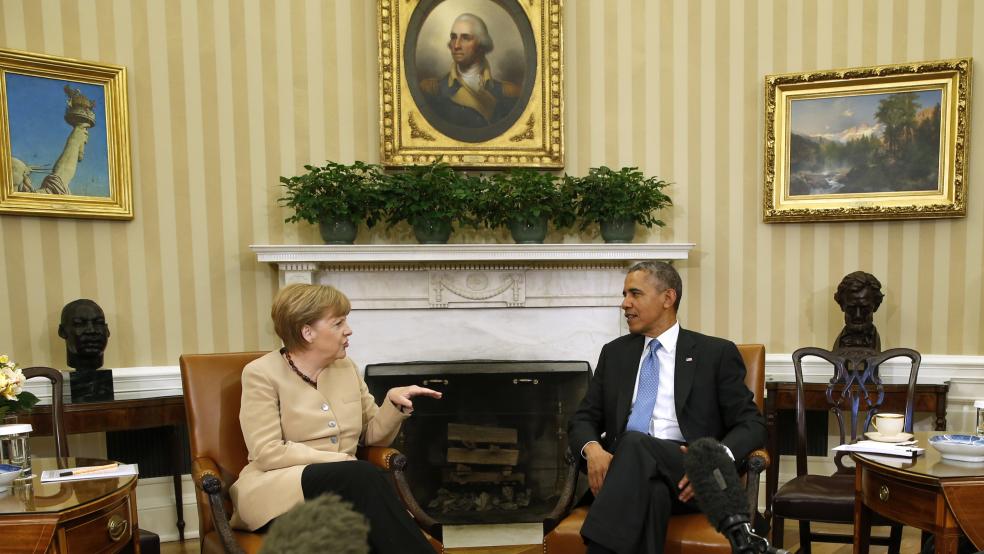On Sunday, just two days after meeting with President Obama in Washington, German Chancellor Angela Merkel spoke with Russian President Vladimir Putin by phone to stress the importance of “effective international action" to ease tensions in Ukraine.
The latter part of the call was likely more important to Merkel than anything happening in Ukraine. The Kremlin said the two leaders also discussed the security of Europe’s gas supply. Russia supplies about one third of European natural gas, and European payments for Russian energy make up some 40 percent of Russia’s state budget. The relationship is imperative to both.
Related: Russia’s Military Bear Is a Paper Tiger
Germany, as Europe’s biggest economy, is the one country that could hold Putin’s feet to the fire by calling for sanctions on Russia’s energy sector. And Merkel is the world leader that’s closest to Putin; she has often served as a go-between for Obama and other world leaders.
However, despite protesting publicly, Merkel has done little to check Russian aggression in Ukraine other than sanction some wealthy Russia individuals. At the same time, ties between Berlin and Washington remain strained following allegations that the NSA targeted her cell phone.
Stephen F. Szabo, executive director of the Transatlantic Academy at the German Marshall Fund, says the crisis in Ukraine could mark a dramatic change in the nature of the relationship between Germany and the United States. During the Cold War, opposition to the Soviet Union bound the two. After the Cold War, the relationship was based on wells of trust that had been built during the standoff.
Related: Putin Divulged His Plot to Reunify the USSR Years Ago
Now, according to Szabo, Germany is reevaluating its relationship with Washington, and could turn east instead of west.
“We’re looking at a pretty serious change in the German relationship with the United States,” he said. “We’re seeing a split in Germany over the east or the west.”
The Ukraine crisis puts Merkel in a difficult spot. If she choses Washington, she risks alienating her most important energy partner. If she choses Moscow, she risks alienating long-time allies while putting an important trade deal, as well as Germany's moral authority in international relations, at risk.
Iraq War Backlash
Szabo said that the relationship between the United States and Germany began to significantly deteriorate in the run-up to the Iraq war. Germany, which is prohibited by its constitution from waging offensive war, was vehemently opposed to it. Former President George W. Bush did little to acknowledge German concerns about the war, escalating tension.
“Back then the two governments were doing everything they could to make it worse,” he said.
At the same time, ties between Russia and Germany grew. Germany signed a deal with Gazprom to build a pipeline directly from Russian soil to Germany. Germany tried to help Russia diversify its economy by attempting to get it into the auto business.
Related: How Obama’s White House Lost Ukraine in a Few Stupid Steps
The revelations about NSA spying have once again turned the German public against the United States. A recent poll found that Germans were split on whether Putin or Obama is a better partner.
“The NSA thing is something representative of a deeper alienation of the United States,” Szabo said. “There is something deeper going on.”
Saved by Trade?
Neil Thompson, editor at atlantic-community.org, says the one thing that ties Washington and Berlin is the Transatlantic Trade and Investment Partnership (TTIP). The deal would add billions of dollars to the American and European economies.
“Getting TTIP passed is on the agendas of both the Obama Administration and Merkel’s government,” he said. “Berlin will not get what it wants on the NSA issue, Washington will not get very much from Merkel over Ukraine and TTIP will get a little push forward.”
Top Reads from The Fiscal Times





